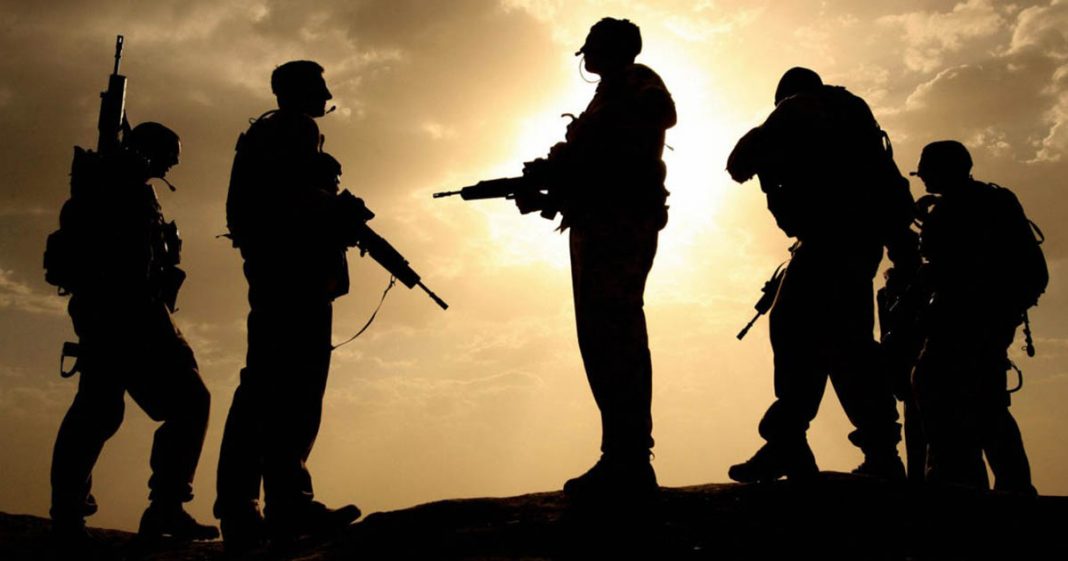As the Taliban, the Afghan government, and the US are jointly working on improving the law and order situation in Afghanistan, there is relentless propaganda spread by the Indian intelligence agencies and war-mongering media to sabotage the peace process. After a university was attacked by militants on Monday, there emerged some reports suggesting the Taliban’s role behind the massacre. However, an affiliate of ISIL (ISIS) claimed the attack that left 22, including 18 students, dead.
According to news sources, the assault started after two attackers entered the university’s training center – located at the two-story Law Faculty building – throwing grenades and firing bullets in classrooms. It took six hours for the Afghan forces to end the gun battle after they killed the attackers.
Read more: Reason behind Pakistan’s policy shift towards Afghanistan
After the attack, AFP reported that the Taliban has been gaining control of many regions in Afghanistan as the government’s influence wanes. The Taliban have also been collecting taxes that have already cemented them as a functional government in most regions. Similarly, The New York Times reported that most of the country’s highways are already under Taliban control and hence make it very difficult strategically for government forces to deploy into rural areas.
“Ups and downs” during the Afghan peace process
On October 3, the Taliban finally named a 21-member delegation for peace talks with the Afghan government. According to Zabiullah Mujahed, the group’s spokesman, the negotiation team has been announced based on a decree by Amirul Mumineen, Taliban chief Mullah Hibat Ullah.
The ongoing status of Afghan talks was disclosed in an interview conducted by Public News Pakistan with Dr Muhammad Naeem, Taliban’s spokesperson of Political Office. Adnan Haider was interested to understand and reveal the crux of the discussion, in addition to whether and why there was a delay in the talks.
Read more: Op-ed: What does the US’ withdrawal from Afghanistan mean for Pakistan?
The spokesman said that there are always some “ups and downs” in all discussions, and the same is the case with the Afghan talks. He claimed it is because of these ups and downs that delays happen, and that there is no one in particular who is to be blamed for these delays, nor is there any specific individual who is against the talks, as per his knowledge. “Afghanistan acquiring peace and staying at peace is a win-win situation for everyone. Adopting an Islamic system within Afghanistan is within everyone’s interest. Everyone wants all the problems to end”, guaranteed spokesman Naeem.
Who is behind sabotaging the Afghan peace process?
It is important to note that Sher Muhammad Abbas Stanikzai, the chief Taliban negotiator, said that India has always supported traitors in Afghanistan.
Abbas Stanikzai, #Taliban Chief Negotiator in a new interview today:
"#India has always played a negative role in #Afghanistan. India supported traitors in the country." pic.twitter.com/y36lHxPLZM
— Afghanistan NEWS (@IAfghanNEWS) May 16, 2020
“India has always played a negative role in Afghanistan. India supported traitors in the country,” Stanikzai said in an interview today, according to Hashim Wahdatyar, a former director at the Institute of Current World Affairs.
India has repeatedly been accused of using the Afghan soil to destabilize its archenemy Pakistan. It has also been investing massively in minority ethnic groups against the ethnic Pashtun majority in Afghanistan due to their Pakistan-leaning.
India has a mounting diplomatic challenge as the Taliban, which New Delhi has despised, appears to be making a comeback to Kabul’s power corridor. It is worth recalling that India was forced to escape Afghanistan after Taliban assumed power in Kabul on September 26, 1996. After almost a period of five years, in November 2001, a plane carrying a small delegation of Indian diplomats landed in Bagram airbase, north of Kabul.
Read more: Trump says wants US troops out of Afghanistan by Christmas
According to a report, India has cultivated a strong relationship with successive Afghan governments, investing heavily in the development and infrastructure of the war-ravaged country, with the total aid of nearly $2bn since 2001, the largest that New Delhi has contributed to any nation.
However, the country was not been active during the Afghan peace talks between the Taliban and the US where Pakistan played a decisive role. Analysts believe India’s policy has not been a success to build a strong, sustainable relationship with Afghanistan.
Kabir Taneja, a security analyst and a fellow at the Observer Research Foundation believes that “New Delhi has backed Afghanistan’s democratic system, and put its weight behind the presidency of Ashraf Ghani. However, even as an expected actor in an event such as talks with the Taliban, New Delhi, unfortunately, built limited capacities over the years for its opinion to be strong enough to be a by definition regional player in helping Afghanistan politically.”
“India’s Afghan outreach, that of developmental aid, people to people contact and so on relied on the security cover provided by the US and its allies. With that gone, the policies of New Delhi will need a serious re-visit,” Taneja pointed out.
Hekmatullah Azamy, deputy director at the Centre for Conflict and Peace Studies in Kabul, said India will have to undoubtedly start a dialogue with the Taliban. “It also needs to be seen if the Taliban will be open to talking to them,” he said.
Read more: Op-ed: India one of the major players in Afghanistan’s domestic and foreign affairs
“Taliban’s relationship with Pakistan and militant groups in the region will have a huge impact on the future of India in Afghanistan,” Azamy said, adding that while Taliban in the 1990s was far more independent of foreign influence, they still leaned towards Pakistan on policies related to India.
“Even in the best of scenarios, it is unlikely that the Taliban would be open to working with India. For instance, the Taliban may not want the army cadets to be trained in India,” Azamy said.














